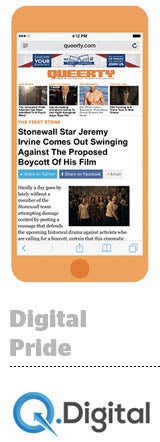 Brands need to earn the right to advertise directly to the lesbian, gay, bisexual and transgender community.
Brands need to earn the right to advertise directly to the lesbian, gay, bisexual and transgender community.
It’s a matter of credibility, said Albert Thompson, a digital strategist at multicultural marketing agency Walton Isaacson, in charge of the Lexus business.
The car brand has a longstanding relationship with LGBT media company Q.Digital, the parent to a number of online properties including GayCities, Queerty, LGBTQ Nation and Dragaholic.
Together, the sites bring in between 6 million and 9 million monthly unique visitors and generate 73 million monthly impressions.
“Any brand’s first foray [into LGBT marketing], especially when they’re selling a product that costs $50,000 and up – well, it’s not like selling toothpaste where you can just start selling them tomorrow,” Thompson said. “When you’re selling something so expensive, you need to get along before people go along, if you know what I mean.”
That means building brand equity through authentic content.
Lexus, for example, partners with Q on an ongoing reality web series called “Out In GayCities,” which features couples taking mini road trips in new Lexus vehicles.
“It’s a way to introduce people to Lexus and show off the car without being didactic,” said Scott Gatz, Q.Digital’s CEO and founder and a former Yahoo product exec. “It’s branded content, but it’s not pure advertising.”
Lexus maintains an always-on hub of sponsored content on GayCities, including the road trip web series, that continues to live on digitally and only comes down at the brand’s request. Each video generally garners between 50,000 and 100,000 views over its lifetime – a not insignificant number keeping in mind the size of the audience, which only comprises roughly 10% of the US population, according to Gallup.
“When you think of the average print circulation, it could be around 200,000,” Thompson said. “So, 100,000 [people] watching a two- to four-minute video exceeds our expectations.”
Branded content is now a component of nearly every proposal that Q.Digital submits when it’s pitching for business, said Gatz.
Programmatic is also on Q’s radar, but the majority of its business is direct sold. It does, however, run private marketplace deals through AdX, Rubicon and others if that’s what the advertiser wants to do.
“A lot of the custom things we do for advertisers we can’t do programmatically, but obviously we want to be everywhere our advertisers are, and if they want to buy programmatic as part of their campaign, then we help them do it,” Gatz said. “Our favorite clients, though, are the ones who recognize that we’re the ones who really know how to talk to our audience.”
It’s an audience brands want to reach. The combined buying power of the adult LGBT population in the US alone is estimated at roughly $884 billion a year – globally, that number is $3.7 trillion.
Brand loyalty is also extremely high within the LGBT community, with 70% willing to pay more for products produced by companies that support diversity and equal treatment, according to research conducted by Community Marketing Inc. and Harris Interactive.
“It’s long been known that this is a lucrative audience and it’s an audience I believe is largely untapped,” Gatz said. “But the issue is less about the audience and more about the advertisers themselves. In each category, there are probably only one or two advertisers really trying to talk to this audience in a genuine way.”
One such advertiser is Stoli. The vodka brand first started using GayCities as a paid media outlet for display in the summer of 2013, just before gay rights activists starting boycotting Stoli in reaction to Russia’s anti-gay legislation. Q.Digital stuck with Stoli throughout the boycott controversy and the relationship quickly deepened.
At the time of the boycott, Stoli had already been working to support the LGBT community for several years, including with the appointment of a full-time San Francisco-based LGBT national brand ambassador in 2012. With Q.Digital, Stoli worked to reaffirm its bona fides.
Although Stoli’s main target is millennial men, LGBT consumers are a close second. It’s a challenging target to reach.
“When you’re dealing with a smaller target, a specialized target, it’s valuable to work with someone that’s an expert in that particular community,” said Lori Tieszen, CMO and SVP of marketing at Stoli Group USA. “Q.Digital plays a very consultative role for us. We think of them more as a marketing partner than just a media outlet.”
Right before the Stoli hit the fan in 2013, Q.Digital began producing a custom event for the brand hosted on GayCities called “Stoli Guy,” a competition in 12 US cities to find a national spokesmodel for Stoli. Q.Digital leveraged its audience across its various properties and produced custom content to raise awareness and bolster attendance. A dedicated “Stoli Guy” microsite garnered 130,000 uniques.
Live events are valuable, but digital is one of the most effective ways to connect with this audience at scale, said Thompson. The LGBT community engages with mainstream media – TV, radio, print – but it isn’t necessarily the best way to reach them from a targeting perspective.
“The LGBT segment is restricted in terms of media options,” Thomson said. “[And] broadcast is only relevant when you’re spending.”












